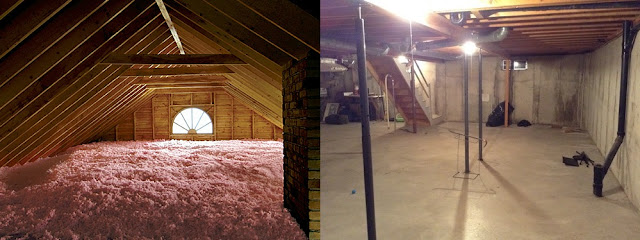

What Lies Beneath A Property's Surface?
What Lies Beneath? No, I'm not referring to the horror movie. I'm talking about uncovering issues in properties that could become a nightmare. When touring buildings, the need to look past the surface beauty to focus on the real concerns, are extremely important. Some properties you can fix and others you might nix and therefore pass on making an offer. Take your time and consider taking an expert with you. This is your time and money we're talking about, so discover the defects and uncover the cover-ups now before you buy.
As a Pittsburgh, PA Realtor who shows homes, investment & commercial properties, I am always looking for things to uncover. Things that the naked or inexperienced eye may not see. This is to help determine if a property has potential or is just a bad investment.
Dropped ceilings, paneling on the walls and questionable electrical connections are just some of the things worth a second look. When touring a home or investment property, feel free to be a bit invasive like looking under the sinks, going up into the attic and down in the basement. Surveying the walls for mold and peeling paint to walking around finding a sloping floor or pooling water is important. Feel free to raise/lower the windows to find those that don't operate. Determine if there are breakers or fuses. And not just limited to the inside, walk the perimeter of the outside looking again for stained and peeling paint, improper grading on the exterior, soil/water going into the building and so on. Examine the property for termite damage which could appear as splintered or tunneled wood. These are just some of the things to look out for and you may have to search high and low for them.
Again, climb up into the attic and go down into the basement. Review where water is flowing as there could be potential water damage. Outside, look at the downspouts. Are they properly installed? If they are not conducting the water accurately, over time, there could be water damage. Also camouflaged brick work might be hiding something. Shrubbery may also be hiding something, so feel free to get in the bushes to look at the foundation. These are things you want to see. With that said, I am not accusing anyone of knowingly covering up something. While occasionally that does happen, most Sellers are not trying to scam anyone at all, but you can tell when things just don't line up. That's also what a seller's disclosure is for and you can ask for it.
There are also things you will want to smell. And I'm not talking the freshly baked cookies or a candle that many people stage at a home showing. I'm referring to noxious, potentially more dangerous, odors. Pets and cigarette smoke can be rectified but mold and mildew, often caused by improper ventilation, needs remediation. We've talked about seeing things and smelling stuff, but let's not forget touch.
Soft plaster and floors that give when you walk on them are red flags and need to be investigated further. If you are walking from room to room and feel major temperature changes, it could be something as simple as vents closed off in certain rooms, but it could also be something far more serious.
Inspector Clouseau looks for clues to a murder. Your goal is to do your due diligence when buying real estate. I know it seems like a lot when you are going into a property for the first time. You may not feel as comfortable or knowledgeable as a professional home inspector does. Not to worry as you don't have to go it alone. An experienced Realtor, who has also observed many inspections, will see the writing on the wall even if it's written in invisible ink. With that said, it's important to point out that a Realtor is not an Inspector. So hiring an Inspector to inspect a home or investment property, that you have put a bid on and won, should be your next step.
When do you need an Inspector? After you've made an offer on a property and it's been accepted. A home inspector will check out the house for major flaws that might need to be fixed. They inspect the roof, full exteriors and interiors including garages, structural elements, plumbing, electrical, heating and air conditioning plus all of the components that are subject to a home inspection. Yes it costs money and the buyer is expected to cover the cost, but it's so worth it.
Things may look like they are in great condition, but looks can be deceiving. An Inspector's discoveries can help tremendously provided that you have included an inspection contingency on your offer. This allows you to renegotiate certain items with either the seller to fix or you to fix perhaps with a seller's compensation. Some issues are minor so don't feel you need to haggle on every single detail. Things that are of a structural or safety issue should always be addressed. And if a seller is unwilling to do so, or to compensate for, then you may have the right to walk away from the deal. Your Realtor can help in the negotiation process. You don't want to lose the deal if you don't have to so having a team of people to advise you is a wise investment.
When it comes to buying real estate, you never have to go it alone. A Realtor's life is touring properties day in and day out. They live and breathe real estate. Many see enough homes, investment and commercial properties to know what things to look out for. They can certainly raise the red flags but you still need an Inspector to identify them with a plan of action for repair. The old adage that "It takes a village to raise a child" is also true for real estate you are considering. It takes a group of experts in their unique fields to help you find "What Lies Beneath".














Comments